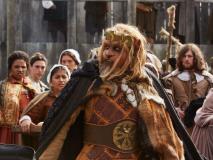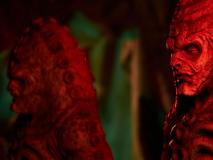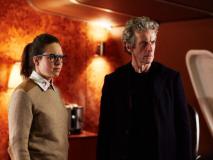According to
Planet Who, "BBC2's Doctor Who Night pulled in a high of 10.73% of the audience share last night, dropping to 7.56% during the special Doctor Who Mastermind edition at 8.40pm. Approximately 2.4m tuned in to watch The Story of Doctor Who between 7.30-8.30pm."
The repeat of "The Story of Doctor Who" was an edited repeat, featuring absolutely no new material but removing a few segments. Lost was the original pre title intro from Jon Culshaw (aka Tom Baker) also lost was a small section towards the beginning of the programme about Hartnell and a longer section of Terrance Dicks and Barry Letts discussing their era.
Welsh assembly first minister
Rhodri Morgan faced a rather interesting moment recently, according to several press accounts. Says BBC News: "First Minister Rhodri Morgan almost became a tree-like monster in an episode of Dr Who after being mistaken for an actor, it has been confirmed. Mr Morgan arrived at BBC Wales' Cardiff studios to appear on the political show Dragon's Eye at the same time as a group of extras on the sci-fi series. The mix-up was noticed as he was ushered into a make-up room to become a tree-like sidekick of new monster Jabe. An employee from London has been blamed for the case of mistaken identity. A spokesman for the First Minister confirmed the accident and said: 'They were filming Doctor Who at the time and there were loads of extras at the BBC Wales studios. A meet-and-greet guy from London obviously did not recognise him. A young make-up artist then came in and said to Rhodri: 'Oh are you one of the trees?'. Rhodri then twigged and had a good chuckle about it. He thought it was really funny. Viewers will have to watch Doctor Who to see if Rhodri is in it.'" The story has been reported by
BBC News, in the
Guardian,
This is London, the
Scotsman,
Wales on Sunday, the
Express,
UTV Internet.
Most of the UK's Sunday press had some coverage, largely in the form of previews in their weekly TV listings. Amongst others, the cover of the Sunday Telegraph's TV and radio listings magazine section features the Doctor and Rose, and previews Project: Who?, Confidential and the first episode ("a winner"). The Observer has a full-page interview with Christopher Eccleston in its
review section and also previews next week's programmes and episode (although it's not very complimentary about the episode). And the Independent on Sunday has a fairly lengthy interview with Billie Piper in its reviews magazine, as well as the usual (this time positive) previews in its listings.
The Mail on Sunday featured an extensive two page spread on Delia Derbyshire, the lade that put the "wooo ooo" into one of television's greatest signature tunes, illustrated with images of the TARDIS, Delia in the Radiophonic Worskhop as she composed the theme, how she appeares shortly before her death and the billboard poster image of the Doctor and Rose. Doctor Who was also on the opening page of the television guide section of the "Night and Day" magazine, and was their "SWITCH ON!" choice for Saturday 26 March, illustrated by the picture of the Doctor performing his card trick.
Also in the Sunday Mail today: a list of the Doctor's "special friends," reviewing many years of assistants and their take on romance in the TARDIS. "I haven't the foggiest who Billie Piper is but I'd tell her to be careful of turning her role into a romantic one. It may not work out," says Lalla Ward. "I think actors can get muddled up in their heads, until they don't know the difference between themselves and their characters. You spend two years prancing around with somebody on TV and you end up thinking it's really you. It would be hard to go back once you crossed that line." Says Louise Jameson: "Everything has to change, obviously, but part of Doctor Who's charm is its innocence. It's very important the girl has sex appeal to keep the male viewers interested but it would be a shame to make the story itself sexy. It brings a whole other connotation." Jameson also notes the danger of being typecast: "Doctor Who is for life - not just for the short duration you're acting in it. If Billie plays her cards right and keeps the fans happy, that's what she will face. When she leaves the series, she should try to do a lot of work in the theatre until people have forgotten her role." Debbie Watling has some different ideas: "To me, the relationship was always more fatherly. It kept the children interested and made the fathers think they were in with a chance. It's got to have an innocence or you're lost. ... The fact there were little men inside the Daleks made them hard to appear menacing. I'd tell Billie to get all of her giggles out in the rehearsals. When the cameras come on, no matter how ridiculous the monsters are, you've got to keep a straight face."
The Sunday Express featured a two page spread as well, this time on the female companions of Doctor Who. Listed were Susan (with an interview with Carole Ann Ford), Vicki (with an interview with Maureen O' Brien), Polly, Zoe, Liz (with an interview with Caroline John), Sarah (with an interview with Elisabeth Sladen), Leela, Romana I, Nyssa, Tegan, Peri (illustrated with a photo of Janet Fielding), Mel and Ace.
Many articles this weekend also featured reviews. Today's Guardian says that "The rule in adapting much-loved properties - whether an old TV show or a Jane Austen novel - is that you're in trouble if aficionados of the original story absolutely hate it but equally doomed if they completely love it. Like a political party, a television series needs to reach beyond the obvious fan-base. ... The first story suggests that Davies has found the right balance between respect and renovation. The internet and the London Eye play significant roles but the Tardis retains its 50s exterior and an interior representing a 60s idea of the future. And - despite the possibilities of computer generation available to this revival - the opening episode rather encouragingly uses monsters who look as if they could have been knocked up by BBC props 40 years ago. ... The risk was always that this: 'Who' would lead to the question: 'Why?' but there's a strong chance that another generation of children will, each Saturday, be asking: 'When?'"
Today's
Independent on Sunday ABC magazine - the Arts Books Culture section of the quality broadsheet - had Billie Piper as its cover feature. Also flagged up on the front page of the main paper as part of the promo strap underneath the masthead, the three-page piece - including a full-page BBC portrait photo of Piper - looked at her life and career to date and asked if she could handle the superstardom that seemed certain to be hers. Craig McLean, who met her five days before the press launch in Cardiff, reported favourably on Piper and the series, incorporating the opinions of Canterbury Tales co-star James Nesbitt, Tales update writer Pete Bowker, Brian Hill, who directed her in last year's BBC2 drama Bella and the Boys, Russell T Davies, former Smash Hits pop magazine editor Gavin Reeve (she was chosen to star in a promotional campaign for the magazine at the age of 14, which started her pop career rolling), and Innocent Records label boss Hugh Goldsmith (Piper was signed to Innocent). The piece, which also carried a photo of Piper with Chris Evans, a BBC promo photo of Piper as Rose with Christopher Eccleston as the Doctor, and one of her while she was a singer, finished with Piper saying she wouldnÆt be watching Doctor Who this coming Saturday - instead, she'd be down the pub! McLean's conclusion? Piper is someone "we underestimate . . . at our peril". The magazine's front-page illustration of Piper was a caricature by Andr? Carrilho. In addition, the show was TV choice of the week in the preview section, while Doctor Who Confidential was also marked as one of the TV choices for next Saturday (26 Mar).
Several reports covered the
Doctor Who: Mastermind event from last evening that aired on BBC2's Doctor Who Night. "A Norwich woman has helped break the sci-fi buff stereotype after beating thousands to win a Dr Who Mastermind special," says Norwich Evening News's
report. "Karen Davies, of Nelson Street, said she was astounded at winning the TV contest after going on it for a bet to prove a woman 'with a life' could win. Ms Davies was picked along with three others from 7000 applicants to go on Saturday's show. 'I wanted to show Dr Who fans are not all nerdy boys and some of us do have a life,' she said. She put on her application form that she wanted to dispel the anorak image, something which Mastermind quiz master John Humphrys asked her about. But the 39-year-old health club manager said: 'It's no different to going to Carrow Road every weekend.'"
The Daily Record
asks, "Who's Sexiest in a TARDIS?" "Billie Piper has already lost her first battle as Doctor Who's new assistant," it says. "The 22-year-old former pop star has been beaten in a poll to find the sexiest Doctor Who assistant by former EastEnders actress Louise Jameson. Jameson proved a hit with fans, who remembered her as the scantily clad Leela, who was companion to Tom Baker as the Doctor in the late 70s. ... In fact Piper, who will be seen as new Doctor Christopher Eccleston's sidekick Tyler Rose for the first time on Saturday, was beaten into fourth place in the poll by two more actresses old enough to be her mum. Wendy Padbury, 57, who was assistant Zoe in the late 60s, proved a hit with her leather catsuits to claim third place. And little--known Nicola Bryant, 43, who played American college student Peri 'Perpugilliam' Brown opposite Tom Baker, took third place. She caused outrage during the mid-80s with several scenes in just a bikini." The report quotes an "internet poll" but we haven't found it...
The
Sunday Herald (Scotland) has a new series preview with some spoilers, but there's a nice comment about Christopher Eccleston. "Ah, yes, the Doctor. He's Christopher Eccleston, of course, casting as inspired as making Vincent D'Onofrio a cop. We first encounter him planting a bomb, like a distracted terrorist. Except this guerrilla is fighting to keep us safe. Dressing down for a Doctor - where the dandy of old plumped for crushed velvet and scarves, he sports a battered black leather jacket - Eccleston nevertheless has other trademarks in place. He's feeling his way into the role, just as the Doctor is feeling his way into his new body. But there's already an odd, intense, Tom Bakerish charm, grins flashing at inopportune moments. Then he's irritable, unknowable, cold, with the sudden snappy bitterness the best Doctors always had. More than once, he refers to humans as "apes". There's melancholy, too. The episode ends with Rose agreeing to accompany him on his adventures; but the important thing is the half-hidden yearning with which Eccleston asks her along, more for himself than for her. He's patient, but cosmically lonely."
Today's Sunday Independent (Ireland) says "we should all be grateful for Billie's involvement. Among those tipped for a starring role alongside the Doc during the 15-year gap since the last series was Pamela Anderson. But kick-ass Pam wouldn't have been right as one of the Doc's sidekicks." And how! "There are those who'll want to compare and contrast Christopher Eccleston's performance as the ninth doctor with all those who've gone before; but for many, it's enough to know that the Daleks are on their way back."
What makes Doctor Who special? The Scotsman asks that today. "Last year, the BBC ran a competition to select the best on-screen boffin. More than 40,000 people voted but it was still a fix. The winners were Honeydew and Beaker from The Muppets. Doctor Who came a poor third (after Mr Spock) with only 13 per cent of the vote. That can't be right. ... Forget American puppets who need wires to make themselves animated. And definitely forget Spock, whose character is actually the epitome of an eastern seaboard, Ivy League intellectual of the Kennedy era, busy getting the Federation into some galactic Vietnam War. Give me British sci-fi heroes every time - Dan Dare, Jeff Hawke, Jet Morgan, with the eponymous Doctor high on the list. Why? The answer gets to the heart of the enduring appeal of the Doctor (and of Quatermass, who is also about to be reincarnated, on BBC4)." The article goes into the heroic aspects of Doctor Who: "Like the ancient Greek heroes, Doctor Who was always at the mercy of the Gods and a wayward navigation device in the TARDIS. That's the whole point of heroes - they show you how to deal with an indifferent, even perverse, universe with wit, courage and a stiff upper lip. There was indeed a definite alien quality about the Doctor: he was still archetypally British in an era when being British was an embarrassment. Pretending to be from Gallifrey and having two hearts was an elegant ruse. Audiences could indulge in following a great British hero without feeling the cringe factor. The fascinating thing about British heroes is that they are quintessentially anti-establishment, like Doctor Who. They draw their courage from their own individuality. Nelson gleefully put the telescope to his blind eye. In similar circumstances Captain Kirk might defy Star Fleet Command, but he'd have a moral fit doing so." But the author, George Kerevan, also waxes on the future: "In this era of I'm a Celebrity and Pop Idol, the temptation will be to dumb down the Doctor or eviscerate his character. The Americans did it in 1996, when the impostor Paul McGann pretended to be Doctor Who in the one-off TV movie. McGann used violence and fell in love with an Earth girl. This was Captain Kirk, not the true hero from Gallifrey. ... But if all else fails, there's still the cerebral Professor Quatermass to save us from ourselves."
Today's
Observer discusses Doctor Who collectibles. Writer Guy Clapperton interviews David Howe and Jeremy Bentham to discuss collectibility: "[Howe] says: 'Standard collecting terms apply - anything that's in the box is going to be worth more than any thing that isn't.' Anything complete with instructions and factory sealed is probably going to be in demand, 'but if all you've got is one Louis Marx Dalek out of the box, that's still probably worth ú50 or so: anything from the 1960s is rare.' ... [Bentham] points to the first Dalek playsuit as particularly desirable. Made by Scorpion Automotives in 1964, it was well made for a kids' toy. The factory shipped a few out and then burnt down, with the rest of the stock inside. 'You can pay anything from ú1,000 to ú2,000.' It was replaced by others from other manufacturers, but if yours says Scorpion Automotives on it, it's worth as much as a second-hand car."
The
Wanadoo portal site has some coverage of the new series, including photos and a list of the eight former Doctors rated.
Finally, a word from Russell T Davies himself in today's Sunday Telegraph. "I remember shop-window dummies coming to life. I remember maggots. I remember devils coming out of the sea, an evil plant bigger than a house and a Frankenstein's monster with a goldfish bowl for a head. And if you're somewhere over 35, you might remember the same things. That's Doctor Who, the show that burned its way into children's heads and stayed there for ever, as beautiful and vivid as a folk tale. Now the good and constant Doctor is coming back, and I'm one of those in charge of it. This week, I'm trapped in the tornado of the BBC publicity machine as the launch, on Easter Saturday, approaches. I'll do anything to sell this lovely show." Davies tells the reader what he thinks is so special: "I think the gaps in production made the viewing experience interactive long before digital television was invented. The gaps in the finished product allowed your mind inside, whereas Star Trek, so glossy and perfect and shining, seemed closed: it made you watch, not participate. With Doctor Who, we watched what was, and imagined what could be. ... Meanwhile, back in the real world, the years passed and Doctor Who's reputation declined, and sometimes it felt as though I was the only one still watching. Those lovely gaps in the production became the only thing that we remembered." Davies obviously writes with a lot of passion for what the show means tto him: "As for me, I had one perfect opportunity to close the circle, to link my childhood fantasies with the modern image. The shop-window dummies are back, by virtue of the fact that they are, as The Simpsons' Comic Book Guy would say, the Best Idea Ever. And this time, they jerk to life. They step forward. They raise their hands; they chop down. And after 35 years of waiting, finally, the glass shatters. And the screaming starts
(Thanks to Paul Engelberg, Steve Tribe, Chuck Foster, Martyn Hunn, Paul Hayes, Paul Gordon, Kenneth Smith, Steve Chapman, Scott Wortley, Daniel Hirsch, Alan Darlington, Hugh J. Cregan)























